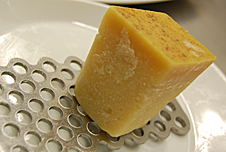
Cheesed off
(Finn comes into the office where Li is working and he looks very angry)
| Li: | Hi Finn. Oh, you don't look that happy today ... Here, have a bit of cheese. |
| Finn: | No thanks, Li. |
| Li: | It's tasty! Italian cheese—my favourite. |
| Finn: | Thank you, Li. But, I'm sorry, I'm just in a terrible mood today. Do you know I have to spend the whole weekend writing a report? |
| Li: | Oh really ... ? |
| Finn: | Well, the boss said my first draft wasn't good enough and asked me to do the whole thing again by Monday! |
| Li: | Not much fun. Sorry Finn. Are you sure you don't want some cheese? |
| Finn: | No. No cheese for me, thanks. I'm ... I'm really cheesed off! |
| Li: | Cheesed off? Is that a medical problem ... ? You can't eat cheese? |
| Finn: | No. In English, 'to be cheesed off' means to be really annoyed. I'm so cheesed off! You can also say 'to cheese someone off'—so, writing reports really cheeses me off. |
| Li: | So ... now I know why you're cheesed off. |
| Finn: | Yes, 'cheesed off' is today's expression in Authentic Real English. Let's hear some examples of how it's used. |
| Li: | No need to be cheesed off, Finn. I can help you with your report. |
| Finn: | Oh really. You're such a sweetie, Li! |
| Li: | But you have to do what I say ... |
| Finn: | Ok ... what do I have to do? |
| Li: | First thing: have some of this cheese! |
| Finn: | Oh, okay. Mmm ... mmmmm ... this is quite delicious! Can I have some more? |
| Li: | You see. I knew you would feel better after eating something. You weren't just angry—you were hungry! Feeling a bit better now? |
| Finn: | Oh yes. Oh, lovely. Thank you. Now, let's get this done. Bye. |
| Li: | Bye. |